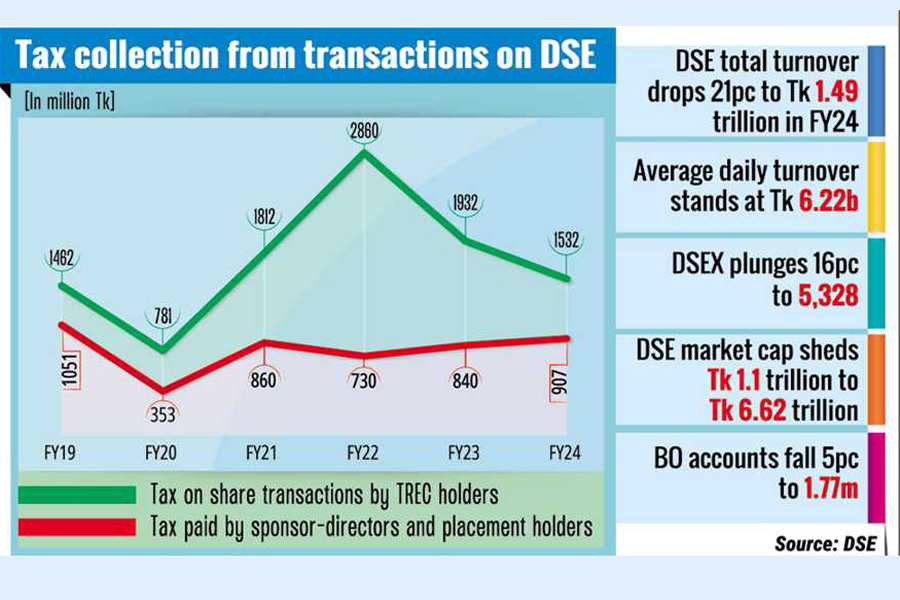
Published :
Updated :

The government's tax revenue from the Dhaka Stock Exchange (DSE) hit a four-year low to Tk 2.44 billion in the just concluded financial year, thanks to lower turnover amid dwindling investor confidence.
Market operators attributed the fall in tax collection to the decline in share transactions by investors in presence of floor price and confidence crisis amid lingering economic uncertainties.
The market was in a floor-price trap for more than seven months of the year. Large-cap stocks witnessed a sharp decline in market value in the year after the withdrawal of the price restriction.
Md Sajedul Islam, managing director of Shyamol Equity Management, said floor price and investors' lack of confidence were the main reasons behind the low turnover.
"The squeezing liquidity scenario and price restriction hurt market participation, leading to lower turnover as well as lower tax collection as tax is related to turnover."
The government earned revenue from TREC (trading right entitlement certificate) holders' share transactions, popularly known as share transaction tax imposed on brokerage firms, and from share sales by sponsor-directors and placement holders.
The DSE, on behalf of the government, collects tax at the rate of 0.05 per cent against TREC holders' share transactions, meaning if a broker traded shares worth Tk 100,000, it had to pay Tk 50 as tax to the government.
The bourse also collects 5 per cent tax on proceeds from sponsor-directors' and placement holders' share sales and deposits the amount to the government exchequer.
On top of that, the government imposes corporate tax on the profits of the bourse and its brokerage firms. Institutional investors and sponsor directors pay 10 per cent capital gain tax.
The market saw 241 trading days in FY24 as the year before, but total turnover dropped 21 per cent year-on-year to Tk 1,498 billion in FY24.
Subsequently, the average daily turnover fell to Tk 6.22 billion from Tk 7.92 billion between FY23 and FY24. Investors were reluctant to inject fresh funds into stocks in FY24 amid a dismal market outlook.
"Most brokerage houses are in dire straits meeting their operating costs as low turnovers have caused a massive dent in their income," said Mr Islam, also former senior vice-president of the DSE Brokers Association.
The main income source of brokerage houses is commission on the trades that they execute on behalf of their clients.
Mr Islam said that a decade ago, brokers used to pay Tk 12.5 against each transaction worth Tk 100,000. The tax obligation rose to Tk 50 while brokers' income decreased significantly.
The intermediaries in Bangladesh are subjected to a much higher tax rate than the neighbouring India, he added.
The market has been struggling since the Russia-Ukraine war began in February 2022 as macroeconomic challenges induced by the war led to pessimistic investor sentiment.
Meanwhile, growing deposit rates and higher return from Treasury bonds prompted savers to move away funds to the money market from the stock market.
Large-cap stocks, considered as blue chips, witnessed an insignificant number of trades during the floor price regime. After the removal of floor prices, the stocks plunged.
Subsequently, the benchmark index of the DSE lost 1016 points, or 16 per cent, to 5,328 in FY24, with market value wiped out by Tk 1.1 trillion.
As the market remained bearish, the number of beneficiary owner's (BO) accounts dropped 5 per cent year-on-year to 1.77 million at the end of FY24. Many investors left the market after incurring huge losses, while some slashed their investment.
babulfexpress@gmail.com


 For all latest news, follow The Financial Express Google News channel.
For all latest news, follow The Financial Express Google News channel.